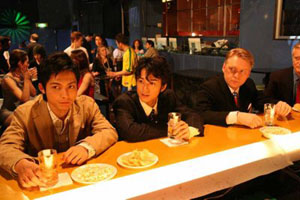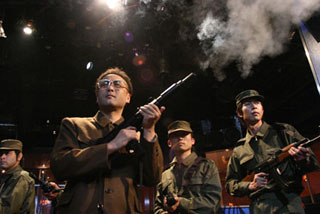Minoru Kawasaki’s The World Sinks Except Japan is a send-up of the 1973 disaster film Japan Sinks, based on the novel of the same name by Sakyo Komatsu (the film was also released in the US in 1975 under the name title Tidal Wave, but nearly half of the film was edited out). That film, as well as the novel, opened the floodgates in Japan for disaster films, so it’s certainly a genre wide-open for parody. Why it took so long for Japan to produce one is beyond me, but leave it to the countries equivalent to Roger Corman to rectify that.

As I’m sure anyone can surmise from the films title, the entire world has sunk into the seas after massive earthquakes, due to global warming and shifting tectonic plates. For some reason, Japan has stayed above water, possibly because it managed to float on top of one of the other sunken continents. It should come as no surprise then that Japan has become a cultural hotbed for all of the displaced people from around the world, including foreign diplomats, Hollywood actors, and just your average Joe. At first, things go well. Movie studios are ecstatic to have Oscar-winning actors in their films, and the diplomats can all finally get along. The Honeymoon period doesn’t last for long however.
Soon, due to Japan’s reliance on imports, the food supply begins to dry up, there aren’t enough jobs to go around, and the native Japanese begin to turn on the foreigners, wanting the country to go back to the way it was before. The outcasts are forced to live on the streets, surviving by any means necessary. Political unrest starts to rear its ugly head, with all those except ones willing to bow down to the Japanese government shunned. But a bigger problem is looming: the tectonic plates are still moving, and Japan may join the rest of the world under water sooner rather than later.
It’s obvious from the outset that The World Sinks Except Japan is a film full of political intent, and seeing as it features actors from every corner of the Earth (the United States, Africa, France, and more), it can really play with those aspects to their maximum effect and not relegate them simply to undertones. The film is quite authentic when you look back at many Japanese disaster films, such as Kinji Fukasaku’s Virus, which also featured an international cast. One could actually choose to look over the political face of the film and take it as a lampoon on Japanese filmmakers possibly being a little miffed about having foreign actors in their films, especially when they're inserted without their say, just like the situation taking place in the film. Just look at the US versions of films such as Godzilla, where the American producers felt the need to add scenes featuring American actors to appeal to their intended audience.
Those that find themselves engrossed by the political agenda of the film will find much to dig into. The Japanese government institutes an organization called the GAT (Gaijin Attack Team) to take out any foreigners who aren’t attempting to integrate themselves into the Japanese culture and deport them to Tibet, which has become a fringe  society ruled by barbarians (although whether Tibet is still afloat may only be a myth; the deported may just be dumped into the sea). Also, the American’s of the film aren’t exactly painted in a nice light. They’re shown as being stupid and stubborn, not caring to learn the language and culture of their new home. Hollywood actors are shown to be arrogant and all about money, and when their US dollars drop in value to mere change, they aren’t above whoring themselves out to make a quick buck. The Japanese public delight in a TV show called “Den Ace” that features giant monsters destroying cities as well as stomping on panicked foreigners; even the hero, Den Ace, crushes the foreigners whenever he’s knocked over by his monstrous foes.
society ruled by barbarians (although whether Tibet is still afloat may only be a myth; the deported may just be dumped into the sea). Also, the American’s of the film aren’t exactly painted in a nice light. They’re shown as being stupid and stubborn, not caring to learn the language and culture of their new home. Hollywood actors are shown to be arrogant and all about money, and when their US dollars drop in value to mere change, they aren’t above whoring themselves out to make a quick buck. The Japanese public delight in a TV show called “Den Ace” that features giant monsters destroying cities as well as stomping on panicked foreigners; even the hero, Den Ace, crushes the foreigners whenever he’s knocked over by his monstrous foes.
I can surely see some people being offended by this, but I’d have to say they’re not seeing the big picture. While everything I’ve noted does indeed occur in the film, I saw the film more as a strong criticism on Japan itself, most notably its foreign policy. The majority of the Japanese are shown as looking down on the foreigners that have been displaced in their country, and think they’re actually helping them by giving them menial jobs such as maids and literal workhorses. One character in the film notes: “The reason the US became such a great nation is because they accepted many immigrants and offered them freedom and opportunity.” You really have to understand that it's been less than 150 years since Japan was extremely closed off from the rest of the world, and more than content to keep to itself and not be influenced by anything or anyone outside of their own. If not for a handful of people that did see the bigger picture, Japan could very well have become another North Korea. Surprisingly, there’s many Japanese to this day that still believe that letting too much of the outside in seriously damages their culture and ethnic pride.
But enough about this serious stuff, I did say this was a parody, didn’t I? There’s some truly funny moments to be had throughout the film, including the aforementioned Gaijin Attack Team (Gaijin literally means “outside person” and is used to describe anyone not of Japanese decent), which is just absurd any way you think about it. Professor Tadokoro, the countries resident scientific genius, is the source of many of the films laughs, going off on ludicrous anecdotes that have little to do with explaining the worlds situation, and often losing his mind or passing out at the critical point when he’s finally about to answer the questions everyone is looking for. His entrances into various scenes are humorous as well, including riding in on a child’s tricycle near the end of the film. One of my favorite scenes in the entire picture is a meteorologist that doesn’t report on the weather; his forecast is about foreigners. He delivers lines
such as, “Be careful on the roads tomorrow, we’ll be seeing a lot of foreigners”, and warnings flash up during the report saying things like “FOREIGNER WARNING IN EFFECT UNTIL TOMORROW!” There are some bad special effects to giggle at, and a truly outlandish and bizarre musical number thrown in for good measure. There are definitely some laughs to be found for those with a quirky sense of humor.
For all the good that can be found in the film, it also has its fair-share of pitfalls. The biggest is easily that the film has long stretches that just aren’t very interesting. The film is very dialogue-heavy, as it’s a low-budget affair, and most of the disaster elements are only spoken of and not actually shown. But some of the scenes drone on for far too long, and some don’t seem to play a very big role in the overall intention of the film and feel more like padding for the runtime. Likewise, there are way too many characters in the film. None really take any precedent over any other, and there’s nearly 10 or more “main characters” to keep track of. This leads to none of them really being fleshed out very well, and you’ll feel much more like a spectator to the events going on than an actual participant, due to not having much feeling towards any of the characters. The acting is spotty at best, and the direction lacks the usual flair that Kawasaki’s other films have. The film is shot in a generally stationary manner, and doesn’t help spice up the proceedings whatsoever. It certainly could be Kawasaki’s intention, but that doesn’t stop it from feeling rather bland.
Much like Kawasaki himself, The World Sinks Except Japan is an odd duck of a film. Rife with political elements, it’s a total spoof and features some wickedly funny elements, yet at times doesn’t deliver laughs for long periods of time. Many will most certainly not get the film and outright hate it, and even I don’t pretend to understand its full intentions, but there was enough here to keep me entertained, even if it was out of a bizarre curiosity more than anything else. The World Sinks Except Japan is an interesting experiment for Kawasaki, even if it isn’t a complete success.
Synapse Films does a great job as usual with their release of The World Sinks Except Japan, as part of their “Minoru Kawasaki Collection”. The film is presented in its original 1.85:1 aspect ratio, and given the 16:9 anamorphic treatment as well as being flagged for progressive scan. The picture is excellent, with rich colors and no damage to speak of. The Japanese audio is presented in Dolby Digital 2.0, and is very crisp and clear. The English subtitles are flawless, although I would have liked it if the subtitles that translated the onscreen Japanese text were a different color or positioned in another spot, as there is much of it during the film, and just capitalizing the text and mixing it in amidst the subs for the dialogue can occasionally get confusing.
The disc has a good amount of extras, and is the only film in the Minoru Kawasaki Collection to feature audio commentary. It comes to us from director Kawasaki and actor Takenori Murano, and they provide some interesting insight on the intention behind making the film. They also speak about whatever the hell comes to mind a lot, but thankfully a lot of it is pretty entertaining. The disc also includes a 40-minute featurette, highlighted by behind the scenes footage and cast and crew interviews. All of it is pretty standard stuff, although I enjoyed seeing how they pulled off some of the low-brow effects. The disc is rounded off with introductions to the film from the cast and Kawasaki himself, the films theatrical trailer, and an amusing promo for the “Den Ace” television show made mention of during the film. Overall, it’s a very worthy DVD release.
Please feel free to discuss "The World Sinks Except Japan" here, in our forums!

